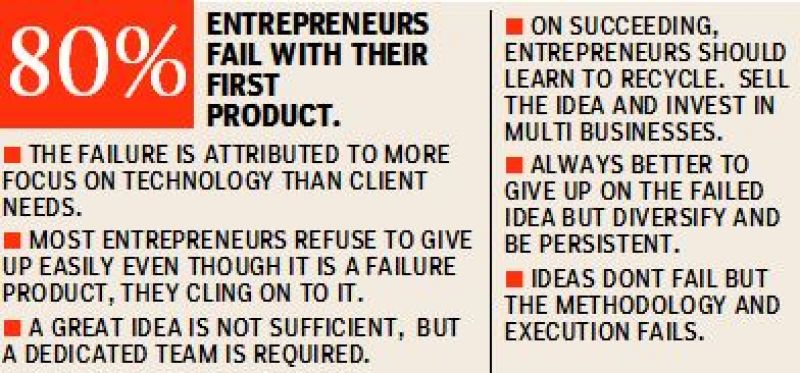Hyderabad GES 2017 Day 2: Failure stepping stone, say experts

Hyderabad: Eighty per cent of start-ups fail in the first two years of their launch globally, mainly because they don’t listen to their customers and end up with client dissatisfaction.
Most invest time and money in products that don’t have 100 per cent global market acceptance. Many entrepreneurs refuse to sell their idea. Other factors include incorrect service line and dishonest employees, apart from poor cash flow.
Ms Claudia Mirza, CEO of Akorbi, who spoke on ‘How to fail better,’ at the Global Entrepreneurship Summit on Wednesday, said, “Most entrepreneurs don’t adapt to their market, don’t give ear to their customers’ needs. If entrepreneurs don’t diversify, they will die. A thinker must evolve from his/her industry, have a strong service line and trusted employees in order to remain in the market. This apart, due to no cash flow, many start-ups hit the end block. The failure also depends on the country and industry. An entrepreneur should always look for profits.”

Other reasons for the alarming failure rate are an unstable investor-entrepreneur relationship, or the product not having a global market.
“An investor always does research, not only of the product, but the character of the entrepreneur, even good behaviour and professional skills are factors to attract investments. Since the investor becomes a team member, she/he looks for a reliable person before investing. Also, factors like market risk, growth and profitability of the product count in the success or failure journey,” an investor said.
The practice of entrepreneur recycling is yet to catch on. It is advisable for entrepreneurs to sell their idea and invest the money in multi sectors, especially if you’re a first time entrepreneur. Start-ups should never hold red flags to investors, this will only worsen the business. Also avoid arrogant investors that don’t consider seeking advice from the entrepreneurs they team up with.
“Start-ups dealing with transport, warehousing, and construction have the worst survival rates. Surveys show that start-ups dealing with the health care sector have a higher survival rate as years are spent in research and development and there are minimal chances of failure,” said Leticia Gasca, founder of The Failure Institute, which helps entrepreneurs deal with failure.

